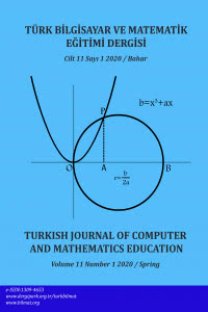Geometride Öğrencilerin Şekil ve Kavram Bilgisi Kullanımı1
___
- Akıncı, A., Sırakaya, M., Yıldırım, D. ve Tüzün, H. (2010, Eylül). Eğitsel bilgisayar oyunlarının eğitim ortamlarına entegrasyonu. 4. Uluslararası Bilgisayar ve Öğretim Teknolojileri Sempozyumu Bildiriler Kitabı (ss. 108-112). Konya, Türkiye.
- Bakar, A., Tüzün, H. ve Çağıltay, K. (2008). Öğrencilerin eğitsel bilgisayar oyunu kullanımına ilişkin görüşleri: Sosyal bilgiler dersi örneği. Hacettepe Üniversitesi Eğitim Fakültesi Dergisi, 35, 27-37.
- Bayırtepe, E. ve Tüzün, H. (2007). Oyun-tabanlı öğrenme ortamlarının öğrencilerin bilgisayar dersindeki başarıları ve öz-yeterlik algıları üzerine etkileri. Hacettepe Üniversitesi Eğitim Fakültesi Dergisi, 33, 41-54.
- Bourgonjon, J., Grove, F. D., Smet, C. D., Looy, J. V., Soetaert, R. & Valcke, M. (2013). Acceptance of game-based learning by secondary school teachers. Computers & Education, 67, 21-35.
- Can, G., & Çağıltay, K. (2006). Turkish prospective teachers' perceptions regarding the use of computer games with educational features. Journal of Educational Technologyve Society, 9(1), 308.
- Çağıltay, K., Çakıroğlu, J., Çağıltay, N. ve Çakıroğlu, E. (2001). Öğretimde bilgisayar kullanımına ilişkin öğretmen görüsleri. Hacettepe Eğitim Dergisi, 21(1), 19-28.
- Chen, Z. H., Liao, C. C. Y., Cheng, H. N. H., Yeh, C. Y. C., & Chan, T. W. (2012). Influence of game quests on pupils' enjoyment ve goal-pursuing in math learning. Educational Technology & Society, 15(2), 317-327.
- Corsi, T. M., Boyson, S., Verbraeck, A., Van Houten, S., Han, C., & Macdonald, J. R. (2006). The real-time global supply chain game: new educational tool for developing supply chain management professionals. Transportation Journal, 45(3), 61-73.
- Çankaya, S. ve Karamete, A. (2008). Eğitsel bilgisayar oyunlarının öğrencilerin matematik dersine ve eğitsel bilgisayar oyunlarına yönelik tutumlarına etkisi. Mersin Üniversitesi Eğitim Fakültesi Dergisi, 4(2), 115-127.
- Demirbilek, M. ve Tamer, S. L. (2010). Math teachers' perspectives on using educational computer games in math education Procedia Social ve Behavioral Sciences, 9, 709-716.
- Demirel, Ö., Seferoğlu, S. ve Yağcı, E. (2003). Öğretim teknolojileri ve materyal geliştirme. Ankara: Pegem A. Yayıncılık.
- Göktaş, Y., Yıldırım Z. ve Yıldırım S.(2008). Bilgi ve iletişim teknolojilerinin eğitim fakültelerindeki durumu: Dekanların görüşleri. Eğitim ve Bilim, 33(149), 30-50.
- İnal, Y., Çağıltay, K. ve Sancar, H. (2005). Elektronik oyunlardaki dönüşümlü oynama özelliğinin öğrenci motivasyonuna etkisi: The incredible machine örneği. TBD Bilişim Kurultayı, Kasım 9-11, Ankara.
- Ke, F. (2013). Computer-game-based tutoring of mathematics. Computers & Education, 448-457.
- Ke, F., & Grabowski, B. (2007). Game playing for mathematics learning: Cooperative or not? British Journal of Educational Technology, 38(2), 249-259.
- Kebritchi, M., Hirumi, A., & Bai, H. (2010). The effects of modern mathematics computer games on mathematics achievement ve class motivation. Computers & Education, 55, 427-443.
- Köroğlu, H. ve Yeşildere, S. (2002, Eylül). İlköğretim 2. kademede matematik konularının öğretiminde oyunlar ve senaryolar. V. Ulusal Fen bilimleri ve Matematik Eğitimi Kongresinde sunulan sözlü bildiri, Orta Doğu Teknik Üniversitesi, Ankara.
- Kula, A., & Erdem, M. (2005). The effect of educational computer games in development of basic arithmetial operation skills. Hacettepe Üniversitesi Eğitim Fakültesi Dergisi, 29, 127-136.
- Lo, J. J., Ji, N. W., Syu, Y. H., You, W. J., & Chen, Y. T. (2008). Developing a digital game-based situated learning system for ocean ecology. Lecture Notes in Computer Science, 5080, 51-61.
- Lopez-Morteo, G. & Lopez, G. (2007). Computer support for learning mathematics: a learning environment based on recreational learning objects. Computers & Education, 48(4), 618-641.
- Owston, R., Wideman, H., Ronda, N. S., & Brown, C. (2009). Computer game development as a literacy activity. Computers & Education, 53(3), 977-989.
- Öcalan, T. (2004). İlköğretimde matematik öğretimi. Ankara: Yeryüzü Yayınevi.
- Özdemir, Ş. (2011, Eylül). Oyun tabanlı öğrenmede geogebra kullanımı: Köklü sayılar keşif oyunu 5th International Computer & Instructional Technologies Symposium. Elazığ, Türkiye: Fırat Üniversitesi.
- Pareto, L., Haake, M., Lindström, P., Sjöden, B., & Gulz, A. (2012). A teachable-agent- based game affording collaboration ve competition: Evaluting math comprehension ve motivation. Association for Educational Communications ve Technology, 60, 723-751.
- Prensky, M. (2001). Dijital game-based learning. New York, NY: McGraw-Hill.
- Prensky, M. (2008). Students as designers and creators of educational computer games. British Journal of Educational Technology, 39(6), 1004-1019.
- Proctor, M. D., & Marks, Y. (2013). A survey of exemplar teachers' perceptions, use, ve access of computer-based games ve technology for classroom instruction. Computers & Education, 62, 171-180.
- Rosas, R., Nussbaum, M., Cumsille, P., Marianov, V., Correa, M., & Flores, P. (2003). Beyond nintendo: design ve assessment of educational video games for Şrst ve second grade students. Computers & Education, 40(1), 71-49.
- Sancar-Tokmak, H., & Incikabi, L. (2013). Integration of the computer games into early childhood education pre-service teachers' mathematics teaching. In S. Keengwe (Ed.), Research Perspectives and Best Practices in Educational Technology Integration (pp.178-196). Hersley, PA: IGI Global Pulishing
- Sönmez, M. T. ve Artut, P. D. (2012, Haziran). Web üzerinden sunulan eğitsel matematik oyunlarının kesirler ve ondalık sayılara ilişkin öğrenci başarısına etkisi. X. Ulusal Fen Bilimleri ve Matematik Eğitimi Kongresinde sunulan sözlü bildiri, Niğde Üniversitesi, Niğde.
- Turan, Z., Küçük, S. ve Gündoğdu, K. (2012, Ekim). Öğretmen eğitiminde bilişim teknolojilerinin kullanımı: mevcut ve beklenen duruma ilişkin bir ihtiyaç analizi çalışması. 6. Uluslararası Bilgisayar ve Öğretim Teknolojileri Sempozyumunda sunulan sözlü bildiri, Gaziantep Üniversitesi, Gaziantep.
- Yiğit, A. (2007). İlköğretim 2. sınıf seviyesinde bilgisayar destekli eğitici matematik oyunlarının başarıya ve kalıcılığa etkisi (Yayınlanmamış yüksek lisans tezi). Çukurova Üniversitesi, Adana.
- Yıldırım, A. ve Şimşek, H. (2011). Sosyal bilimlerde nitel araştırma yöntemleri. Ankara: Seçkin Yayıncılık.
- Yayın Aralığı: 3
- Başlangıç: 2009
- Yayıncı: Türkbilmat Eğitim Hizmetleri
Geometride Öğrencilerin Şekil ve Kavram Bilgisi Kullanımı1
Bülent GÜVEN, Timur KOPARAN, Yavuz KARPUZ
Hasan Topçu, Sevda Küçük, Yüksel Göktaş
Geometride Öğrencilerin Şekil ve Kavram Bilgisi Kullanımı
Yavuz Karpuz, Timur Koparan, Bülent Güven
Dokuzuncu Sınıf Öğrencilerinin Devirli Ondalık Gösterimle İlgili Kavram Yanılgıları
